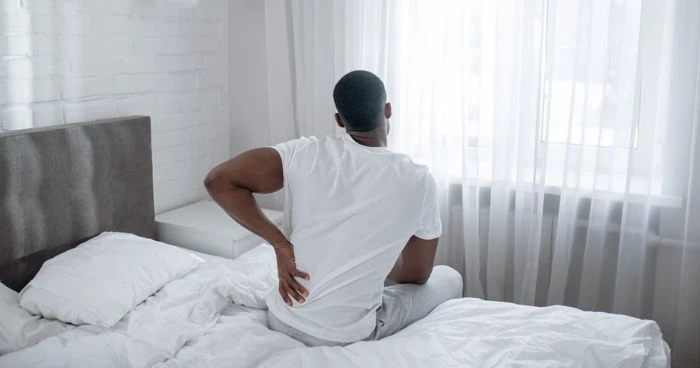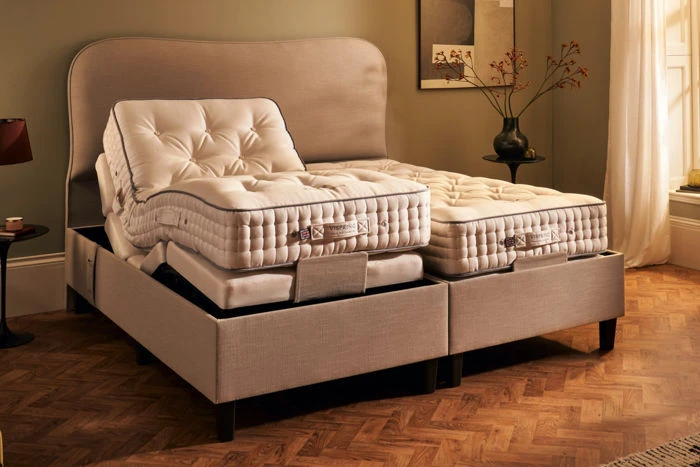WINTER SALE NOW ON | use code WINTER | Save up to 50% OFF famous brands | + FREE delivery* *T&C's apply click here

Do Adjustable Beds Help with Sleep Apnoea & Snoring? Science Says Yes
If you or a loved one struggles with sleep apnoea or heavy snoring, you’ve probably heard about CPAP machines and sleep studies. But did you know that a simple change - like raising the head of your bed - could make a real difference?
Recent scientific studies show that adjustable beds may play a helpful role in reducing sleep apnoea symptoms. Here’s what the research says and how different sleep angles affect your breathing at night.
What is sleep apnoea?
Obstructive sleep apnoea (OSA) occurs when the muscles in your throat relax too much during sleep, causing a blocked airway. This leads to snoring, gasping, and brief pauses in breathing, often without the sleeper realising.
Over time, this can cause:
- Daytime tiredness and brain fog
- Increased risk of high blood pressure, heart disease, and type 2 diabetes
How adjustable beds help
Improved airway clearance
When you lie flat, gravity causes soft tissues in your throat to fall back and block your airway. Raising your head by even a small amount can help keep the airway open, especially for those whose symptoms worsen when lying flat (known as positional sleep apnoea).
Reduced snoring
Snoring is often caused by vibrating throat tissues as air struggles to get through. A slight incline reduces tissue collapse and vibration, making for a quieter night. Studies show that even a 7.5° elevation can significantly reduce snoring.
Better breathing
Studies involving inclines between 7.5° and 30° show:
- Fewer apnoeas (breathing pauses)
- More stable airflow
- Improved blood oxygen levels
And importantly, these benefits come without disturbing sleep quality.
Complementary to CPAP therapy
Using a CPAP machine? Sleeping with your head raised can:
- Improve mask fit
- Reduce air leaks
- Ease pressure on your chest and upper airway
Together, this can make CPAP therapy more comfortable and effective.

What does the science say?
A number of reputable studies have been carried out in recent years which offer evidence of the benefits provided by an elevated sleeping position.
Mild elevation (≈ 7.5°)
In a study of 52 patients, raising the head by 7.5° reduced the Apnoea-Hypopnoea Index (AHI) from 15.7 to 10.7 and improved oxygen levels - without affecting sleep comfort.
Source - Journal of Clinical Sleep Medicine
Moderate elevation (≈ 30°)
A 2023 study using sleep endoscopy found that a 30° incline reduced airway collapsibility at key points like the tongue base and soft palate.
Semi-upright (30-45°)
Another study on post-surgery patients found that semi-upright positioning halved the number of obstructive apnoeas - from 16.6 to 8.6 events/hour.
Summary table: How adjustable beds help
| Benefit | What the Research Shows |
|---|---|
| Reduced AHI (fewer apnoeas) | Proven at 7.5° and above |
| Better airflow & less snoring | Elevation reduces airway collapse and vibration |
| More effective CPAP therapy | Improved mask seal and fewer leaks with elevation |
| Sleep comfort maintained | No reduction in sleep quality across multiple studies |
What’s the best sleep angle?
Everyone's needs are different, and some people might see similar benefits at different elevations. Here's a suggested guide, based on the studies we've looked at in this article:
- Start low (7°- 10°) - Research-backed, easy to adjust to
- Go higher if needed (20°- 30°) - May help with moderate sleep apnoea or loud snoring
- Semi-upright (30°- 45°) - Ideal for positional apnoea or post-operative recovery
Thinking of buying an adjustable bed?
If you’re considering an adjustable bed:
- Look for models that allow precise head elevation (7°-30° range)
- Features like anti-snore or zero-gravity settings are ideal for sleep apnoea sufferers
- Make sure the bed supports both comfort and adjustability.
Take a look at Opera adjustable beds. Their high quality range all offer a preset zero-gravity button; you can also save to memory the position you find most beneficial, making it quick and easy to prepare for a more restful night's sleep.
View our full range of adjustable beds - and get in touch for personalised advice.
Final word
Adjustable beds are not a cure, but research shows they can:
- Reduce snoring
- Improve airflow
- Support CPAP therapy
- Lead to better, more restful sleep
Always speak to your GP or sleep specialist before making changes to your sleep apnoea treatment plan.
Category: Adjustable Beds
Similar Posts
Adjustable Beds for Back Pain
We explain how adjustable beds can support back health, who they’re best suited for, and what to look for if you’re considering one for yourself.
Adjustable Beds & Mattresses: Benefits, Uses & Choosing the Right One
In this guide, we’ll explain who adjustable beds and mattresses are for, how they help, and what to look for when choosing the right one.
8 min read











